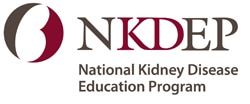Health Information Updates
NKDEP group to help pharmacists educate people with kidney disease
By Bill Polglase

Typically, pharmacists face many barriers in providing care to patients with chronic kidney disease (CKD). In some cases, pharmacists may not feel comfortable talking about CKD with patients. Pharmacists may also have limited time and clinical information for counseling patients in a busy community setting.
To better enable pharmacists to become involved in improving CKD care, the National Kidney Disease Education Program (NKDEP) formed the NKDEP Pharmacy Working Group. Since July 2012, the group has been working to help resolve clinical and scientific pharmacist issues around CKD. As a beginning, the group is developing a continuing education program focusing on non-steroidal anti-inflammatory medications (NSAIDs). Commonly prescribed by doctors and available over-the-counter, NSAIDs can lead to acute kidney injury, especially in CKD patients.
"Pharmacists are in the ideal position for educating patients," said NKDEP Director Dr. Andrew Narva. "They have frequent contact with these patients and can focus on the safe use of drugs."
As well, the group is exploring a pilot project to team with major online prescription networks to automatically include the patient's most recent estimated glomerular filtration rate (eGFR)—the standard for assessing kidney function—on electronic prescriptions. This would help pharmacists ensure the safe dosing and administration of the multiple medications that many CKD patients take, as well as giving the pharmacist information to initiate counseling on CKD for high-risk patients.
"Through the efforts of this working group, we hope to increase the number of pharmacists who can educate CKD patients on medicines and chronic kidney disease," said Dr. Amy Barton Pai, associate professor at the Albany College of Pharmacy and Health Sciences and chair of the NKDEP Pharmacy Working Group. "We want to enable pharmacists to establish community pharmacies as places for patients to receive information about CKD."
More information on chronic kidney disease and medicines, can be found here.
NDEP webinars offer education at your location

The National Diabetes Education Program's Quarterly Webinar Series explores some of the latest advances and challenges in diabetes prevention and control. The webinars provide timely information that supports the work of NDEP partners and others in the diabetes community who are working to improve diabetes treatment and outcomes, to promote early diagnosis, and to prevent or delay the onset of type 2 diabetes.
Past topics—archived online—include diabetes and cardiovascular disease, behavior change, diabetes in children and adolescents, promoting health after gestational diabetes, and diabetes and nutrition in the Latino community. In May, the NDEP will host a webinar on the "Unique Needs and Latest Recommendations for Older Adults with Diabetes."
"These webinars provide NDEP partners with an opportunity to hear from an expert on the practical application of the latest science on diabetes prevention and control," said NDEP Director Joanne Gallivan. "The webinars also help people lean about NDEP tools and resources to support this information."
During the webinars, participants have a chance to interact with the presenters through a moderated question-and-answer session.
Learn more about NDEP webinars or view previous webinars.
NIH program makes it easier to talk about bowel control
June marks the second anniversary of the NIDDK Bowel Control Awareness Campaign, Let's Talk about Bowel Control!
Bowel control problems, also known as fecal incontinence, affect an estimated 18 million U.S. adults—1 out of 12 people. Most bowel control problems improve with treatment; however, many people do not seek help due to embarrassment. Both lack of treatment and embarrassment can have a crippling effect on quality of life.
The Bowel Control Awareness Campaign and its online resources help people understand bowel control problems, a condition believed to be widely underdiagnosed. Fecal incontinence is more common among women and older adults. Increased body mass, decreased physical activity, depression, and diabetes may also increase risk.
Developed by the NIDDK, along with professional and voluntary organizations that focus on fecal incontinence, the awareness campaign offers the following resources about the symptoms, diagnosis, treatment, and management of bowel control problems:
- A fact sheet on fecal incontinence
- An easy-to-read booklet on bowel control (in English and Spanish)
- A stool diary for patients and health care providers
- NIH bowel control research information
- Links to professional and voluntary organizations
Since the initial launch, the awareness campaign has distributed nearly 3,500 resource materials. These resources are available through the campaign's website and the National Digestive Diseases Information Clearinghouse's website.
NIDDK Job Opportunities

Find an exciting new position at the NIDDK! Job opportunities are updated regularly. Check back often to view vacancies, as positions are advertised for 5-10 days. For more information, visit this page.

